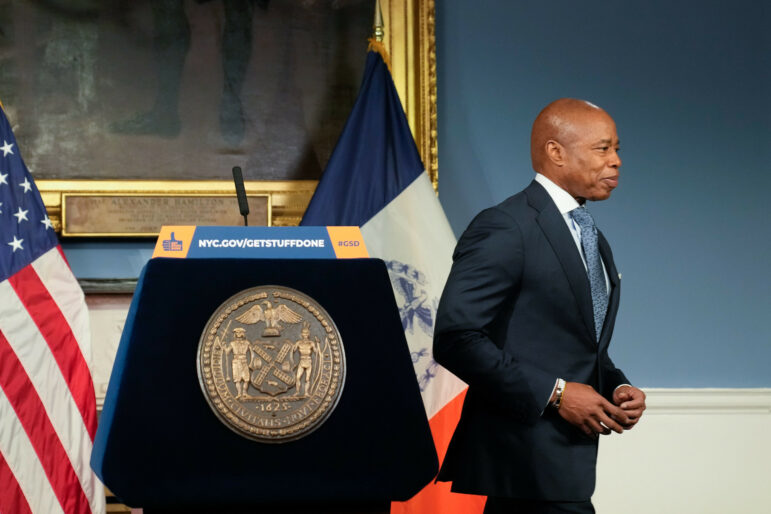“Cutting corners by slashing social service programs will only force New Yorkers to stay homeless longer, reduce their chances of finding permanent housing, and ultimately cost the city more taxpayer dollars to warehouse people in inhumane shelters.”

Michael Appleton/Mayoral Photography Office
Mayor Eric Adams presents his Fiscal Year 2024 preliminary budget at City Hall on Thursday, Jan. 12.New York City’s homeless population has ballooned to levels not seen since the Great Depression. Given the magnitude of this humanitarian crisis, how is the Adams administration meeting the current moment? By releasing a myopic preliminary budget that cuts staffing and funding at critical social service agencies.
Public assistance and rental assistance are on the chopping block at a time when our city faces an immense need, with unprecedented rent hikes and multi-month long waits for food stamps. Mayor Adams is shrinking the Department of Social Services (DSS)’s public assistance budget from $2.7 to $2.3 billion, and cutting an additional $20 million from HPD’s rental assistance programs.
To make matters worse, Mayor Adams also proposes reducing the NYC Commission on Human Rights’ (CCHR) budget by 15 percent by eliminating 20 positions that are currently vacant. Amongst the many hats it wears, CCHR is responsible for protecting tenants from source of income (SOI) discrimination, a rampant and illegal practice that brokers and landlords employ to deny housing to tenants with rental assistance vouchers.
Eliminating staff positions and cutting programs that support struggling New Yorkers is a direct attack on the poor and must be stopped. The city is already operating below capacity, with unfathomable human costs.
Take Kamilah Newton for example, a housing activist and single mother of two with a CityFHEPS voucher. After facing over 800 incidents of SOI discrimination during her five-year search for housing, Kamilah finally secured an apartment for her family in November with the support of Unlock NYC. After this grueling search, it took HRA over two months to process her paperwork and allow her family to move out of the shelter and into stable housing. Like thousands of other families, Kamilah and her children were left to languish in the homeless shelter system for months because city agencies are overwhelmed and understaffed. This system failure is cruel and preventable.
At Unlock NYC, we work closely with New Yorkers experiencing homelessness and housing instability to report SOI discrimination. In just two years of operation, we have received over 1,000 reports across the five boroughs. We see in our daily work that CCHR has long been severely understaffed and unable to handle the volume of complaints we receive each month. When discrimination is under-enforced, our homeless shelters stay full.
It is deeply concerning that Mayor Adams did not mention CCHR’s Source of Income unit a single time in his second State of the City address. While he declared that he would “crack down on landlords who discriminate against tenants based on their source of income,” which we applaud, how can this be achieved without appropriately funding the agency responsible for enforcing New York City’s anti-discrimination laws?
CCHR has investigated and prosecuted landlords and brokers extensively for refusing to rent to tenants using housing vouchers, successfully housed voucher holders in set aside units, and secured nearly $2 million in civil penalties since 2014. While the city did allocate funds for a new “SOI contract” at the Department of Housing Preservation & Development (HPD) to conduct fair housing testing, it remains unclear how these two agencies will interact to effectively combat discrimination. Siphoning off resources to a separate agency under a new initiative seems counterproductive. The mayor needs to fully fund the current SOI unit at CCHR.
As a city, we need to push back against the narrative of scarcity and nearsighted cuts. There is money in New York, and plenty of excellent proposals at the state level to make sure resources are fairly redistributed rather than hoarded at the top, from implementing a progressive income tax to taxing inheritance and Wall Street transactions. These proposals would generate billions of dollars to build a more equitable New York, and the city and state should work together to ensure resources go to the neediest.
It is fiscally irresponsible to cut staffing at agencies that help low-income New Yorkers. It costs an average of $4,000 per month to house a single New Yorker in a city shelter. Cutting corners by slashing social service programs will only force New Yorkers to stay homeless longer, reduce their chances of finding permanent housing, and ultimately cost the city more taxpayer dollars to warehouse people in inhumane shelters.
We urge our leaders to invest in New York City and house our neighbors. We are calling on the Mayor to crack down on discrimination by doubling the size of the SOI unit at CCHR, and to create flexible remote work policies and competitive salaries to attract a qualified workforce at critical social service agencies.
Finally, we want to see real consequences for landlords and brokers who break the law and deny housing to New Yorkers with vouchers. Mayor Adams was quick to criminalize our homeless neighbors, conducting sweeps to remove them from the subways. How long will he continue to ignore the crimes perpetrated against the homeless and the poor?
Jessica Valencia is the head of communications at Unlock NYC. Manon Vergerio is the co-founder and head of data and advocacy at Unlock NYC.
Editor’s note: In response to City Limits’ queries about staffing levels for Source of Income discrimination enforcement at CCHR, a spokesperson for the agency said the following:
“[T]he Commission on Human Rights is committed to protecting New Yorkers from housing discrimination. The current CCHR SOI unit has staff, and in addition to this dedicated team, all Law Enforcement Bureau (LEB) attorneys and staff continue to work on CCHR’s SOI matters.”









One thought on “Opinion: Mayor’s Budget Slashes Vital Funding in the Face of Humanitarian Crisis”
This is a total mess. Cory Johnson should have ran for mayor.